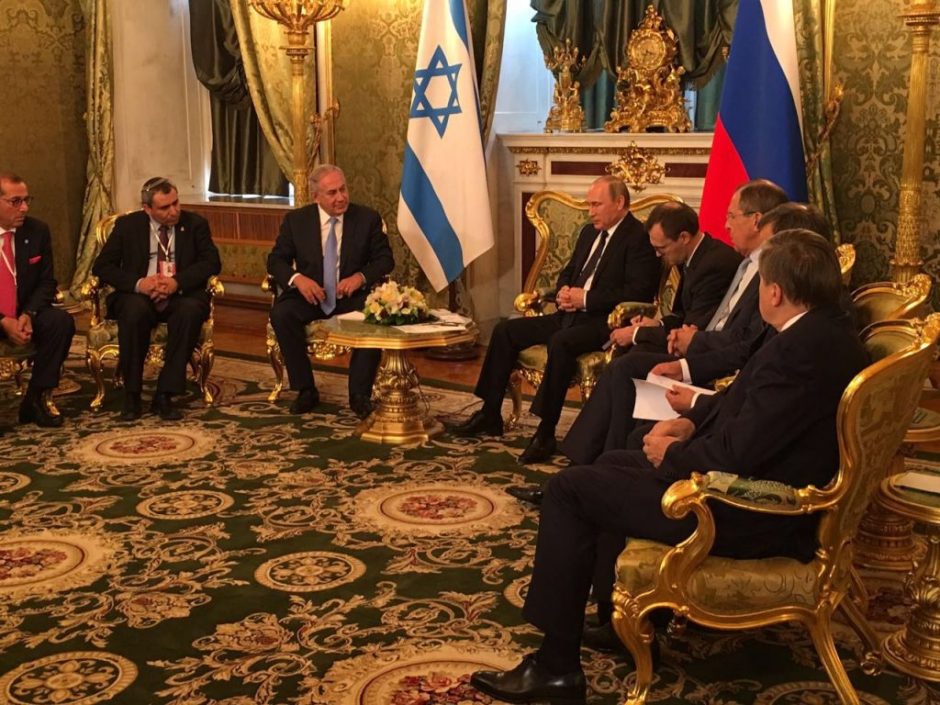Judging by Prime Minister Benjamin Netanyahu’s two-day trip to Moscow last week, during which he conferred with Russian President Vladimir Putin at the Kremlin, Israel’s relations with Russia have never been closer and better.
The cordial bond that Israel has forged with Russia is infinitely stronger than the testy and often bitter relationship it had with Russia’s predecessor state, the Soviet Union.
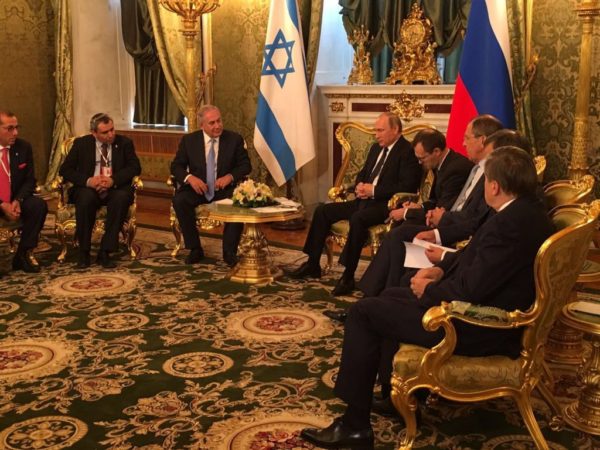
Netanyahu’s most recent visit was his third to Moscow since last September, when the Russian Air Force began bombing rebel forces in Syria opposed to the Syrian regime of President Bashar al-Assad, Russia’s primary Arab ally.
In addition to previous trips to Moscow in September 2015 and April 2016, Netanyahu met Putin last November in Paris at the climate change conference.
During the same time period, Netanyahu has met with President Barack Obama of the United States — Israel’s chief ally and benefactor — only twice. As Netanyahu noted on his last day in Moscow, Israel is not even remotely attempting to replace the United States as its best friend. “There is no alternative to the United States and I am not looking for one,” he said. “But my policy is to look for other partnerships with great powers such as China, India and Russia.”
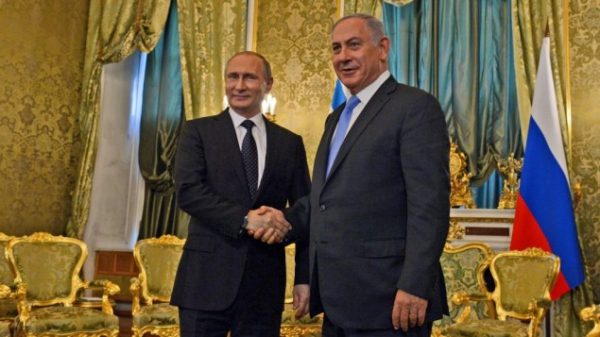
Reviewing Israel’s relations with Russia since the two countries reestablished diplomatic relations in 1991 after 24 years of estrangement and mutual acrimony, Netanyahu said it has changed from enmity and confrontation to friendship and cooperation.
“Russia is a global power and our relations are getting closer,” said Netanyahu on the eve of his Moscow visit.
Putin, whose broad objective is to expand Russian influence in the Middle East, was equally effusive: “We place great importance on our relationship with Israel. We have a solid foundation of trust and understanding to rely on as we make plans for the future.”
Ostensibly designed to mark the 25th anniversary of the renewal of diplomatic relations between Israel and Russia, Netanyahu’s visit was a combination of pomp and substance.
By no coincidence, the Russian government opened an elaborate exhibit on Israel in the center of Moscow, near Red Square, prior to his arrival.
When Netanyahu and his wife, Sara, stepped off their El Al plane, they were greeted on the tarmac with a red carpet, a marching band and a bouquet of pink flowers. During the course of the whirlwind visit, the Netanyahus and Putin jointly attended a ballet performance at the Bolshoi Theater, and Putin personally gave them a private tour of the Kremlin.
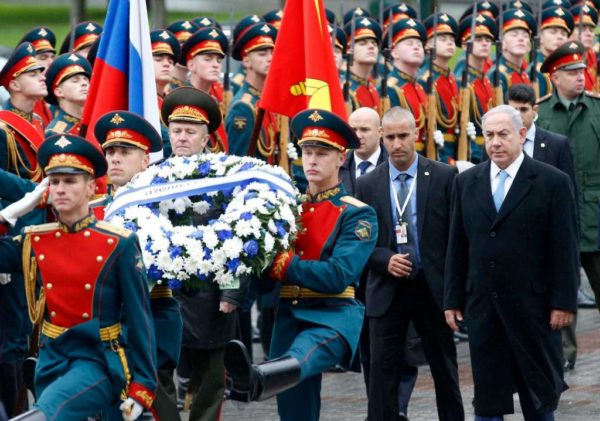
Netanyahu thanked Putin for having agreed to return an Israeli tank that Syria had captured in a battle during the 1982 war in Lebanon. Three of the soldiers manning the tank were taken into captivity and paraded through the streets of Damascus, never to be heard from again. Israel considers them missing in action.
In the aftermath of the battle, Syria sent this particular tank, the Magach-3, to Moscow for examination. After Russian experts had thoroughly examined the tank, it was placed in a military museum.
In a reference to Putin’s decision to return the tank, Netanyahu said, “I would like to thank you on behalf of myself, the people of Israel and the families (of the missing tankists) for this important gesture. It touches our hearts.”
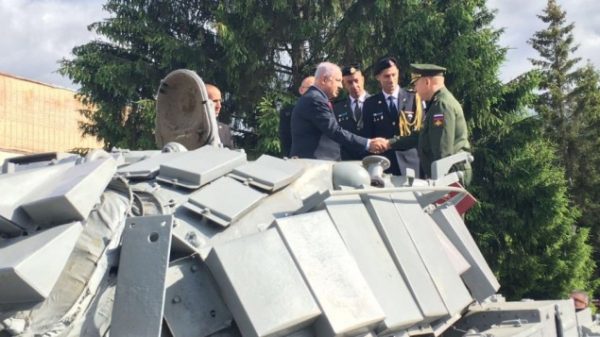
In a speech, Putin spoke of the “humanitarian ties” that bind Russia and Israel, citing the more than one million Russians, Jews and non-Jews alike, who have immigrated to Israel since the late 1980s.
Netanyahu’s interpreter in Moscow was Jerusalem Affairs Minister Zeev Elkin, a Russian Jew who settled in Israel in 1990. Apart from Elkin, two other Jews of Russian origin serve in the Israeli cabinet: Defence Minister Avigdor Liberman and Immigrant Absorption Minister Sofa Landver.
Putin, who described his meeting with Netanyahu as warm and constructive, discussed a wide variety of issues with him.
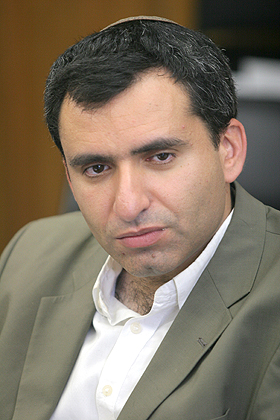
These ranged from trade, tourism, agricultural cooperation and cultural exchanges to the rise of radical Islam, the upsurge of terrorism, the Palestinian question, Russian arms shipments to Syria and Iran, the transfer of advanced weaponry from Iran and Syria to Hezbollah in Lebanon, and the “deconfliction” mechanism that is supposed to prevent the possibility of an accidental clash between Israeli and Russian military aircraft in Syria.
Israel and Russia have common interests, from combating the influence of Islamic State — the jihadist organization that has entrenched itself deeply in Syria, Iraq and Libya — to pushing back the advances of Islamic extremists elsewhere in the Middle East.
“We will be partners in the struggle against terrorism,” Putin declared.
Russia and Israel, however, are at odds over key issues.
Russia supported the Iran nuclear deal, which Netanyahu bitterly denounced and described as a “historic mistake.” Russia, to Israel’s consternation, has sold the S-300 missile defence system to Iran.
Russia supports Syria, Israel’s arch enemy, to the hilt politically and militarily. It also coordinates its military movements in Syria with Hezbollah, Israel’s Lebanese foe.
Russia backs a two-state solution within the framework of a full Israeli withdrawal from the West Bank, and Russia usually votes for anti-Israel resolutions at the United Nations.
Despite its differences with Israel, Russia seems to have no intention of repeating the strategic mistake the Soviet Union made in boycotting Israel. Although the Soviet Union, a communist power, was the first nation to recognize the newly created state of Israel in 1948, Moscow’s ties with Israel were usually bumpy, hostile and unpredictable.
The Soviet Union severed diplomatic relations with Israel twice, in the early 1950s and again in the wake of the 1967 Six Day War, all in the service of consolidating its bonds with Arab states like Syria and Egypt.
By contrast, Putin is strengthening Russia’s relations with Israel while cultivating links with Arab countries and Iran.
It’s a wise policy for Russia to pursue at a time when European and U.S. economic sanctions are biting into Russia’s economy following its annexation of Crimea and its meddling in Ukraine.
